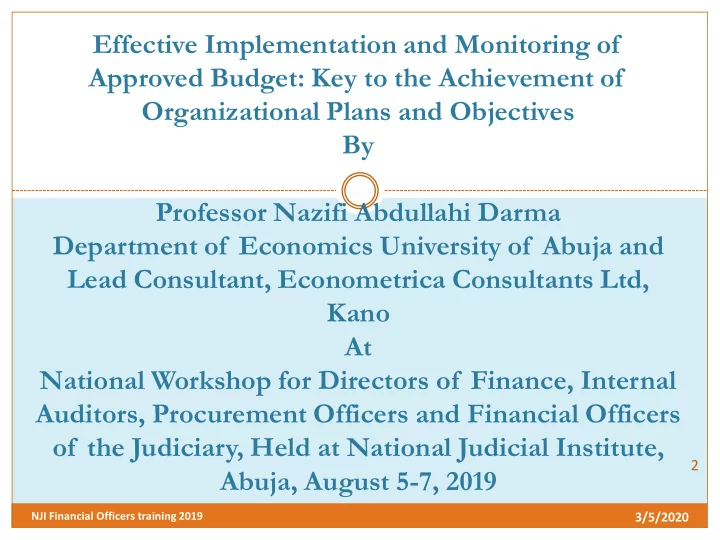

Effective Implementation and Monitoring of Approved Budget: Key to the Achievement of Organizational Plans and Objectives By Professor Nazifi Abdullahi Darma Department of Economics University of Abuja and Lead Consultant, Econometrica Consultants Ltd, Kano At National Workshop for Directors of Finance, Internal Auditors, Procurement Officers and Financial Officers of the Judiciary, Held at National Judicial Institute, 2 Abuja, August 5-7, 2019 NJI Financial Officers training 2019 3/5/2020
Outline of the Presentation 3 Introduction Organizational plans and objectives Role of Effective implementation and monitoring in goals and objectives attainment Risk factors and cases analysis Contingency mitigating strategy Concluding remarks NJI Financial Officers training 2019 3/5/2020
Introduction 4 • Strategic plans encapsulates medium term strategic goals and objectives • Annual budget represent a short term plan for the implementation of long term initiatives • Budgets are actually a statement of expectations- expenditure and revenue • Organizations thrive on the basis of anticipated objectives and goals- drivers of action and plans • Disruptive internal and external factors dampen goals attainment and plan and budget implementation NJI Financial Officers training 2019 3/5/2020
Introduction (Cont’d) 5 • Key internal factors are amenable to manipulation and control- less impactful negativity • External disruptors often out of control and more damaging to short and long term goals and initiatives • Human resources and technical capacity most important tool for goals attainment • Financial resources second most important tool for goal attainment and always in short supply NJI Financial Officers training 2019 3/5/2020
Organizational plans and objectives 6 • Organizational goals are strategic objectives that a company's management establishes to outline expected outcomes and guide employees' efforts • For the goals to have business merit, organizations must craft a strategic plan for choosing and meeting them • There are many advantages to establishing organizational goals: • They guide employee efforts, justify a company's activities and existence, define performance standards, provide constraints for pursuing unnecessary goals and function as behavioral incentives NJI Financial Officers training 2019 3/5/2020
Organizational plans and objectives (Cont ’ d) 7 • Goals help define an Organization's purpose, assist its business growth and achieve its financial objectives • Setting specific organizational goals can also help a company measure their organization's progress and determine the tasks that must be improved to meet those business goals • Goals need to be (SMART)specific, measurable, achievable and timely. By setting clear, realistic goals, organizations have a clearer path to achieve success and realize its vision NJI Financial Officers training 2019 3/5/2020
Organizational plans and objectives (Cont ’ d) 8 • Goal setting, and attaining them, can also help an organization achieve increased efficiency, productivity and profitability • Organizations should clearly communicate organizational goals to engage employees in their work and achieve the organization's desired ends • Having a clear idea of organizational goals helps employees determine their course of action to help the business achieve those goals • Employees should also be equipped with the proper tools and resources needed as they do their work to help meet the overall organizational goals NJI Financial Officers training 2019 3/5/2020
Organizational plans and objectives (Cont ’ d) 9 • Setting goals can also help companies evaluate employee performance -- for example, creating individual employee goals that support overall organizational goals and measuring individual performance against those individual goals • While an organization can communicate its organizational goals through formal channels, the most effective and direct way to do so is through employees' direct supervisors • This enables managers to work with their staff to develop SMART (specific, measurable, achievable, realistic and time-bound) goals that align with the organization's goals NJI Financial Officers training 2019 3/5/2020
Organizational plans and objectives (Cont ’ d) 10 Setting organizational goals also helps build workplace harmony because it makes employees work toward attaining similar goals While developing sound goals helps organizations with planning, over time, goals might turn out to be unrealistic and need to be modified accordingly NJI Financial Officers training 2019 3/5/2020
Traits of Effective Organizational Goals 11 NJI Financial Officers training 2019 3/5/2020
Effective Implementation and Monitoring 12 Establishment of annual objectives Formulation of policies for execution of strategies Allocation of resources Actual performance of tasks and activities Leading and controlling the performance of activities or tactics in various levels of the organization NJI Financial Officers training 2019 3/5/2020
Effective Implementation and Monitoring (Cont ’ d) 13 Organizations have clearly goals and objectives and need to be attainted towards satisfying diverse stakeholders-government, the Bar, Public Implementation framework is the key missing link to drifting from goals attainment Responsibility mapping key to tasks accomplishment Technical and financial resources addition to success factors NJI Financial Officers training 2019 3/5/2020
Risk factors and cases analysis 14 Lack Political leadership that understand long term planning and strategy formulation Low Technical capacity that is constantly updated Absence of Performance Management System (PMS) Feedback mechanism from M&E reports Contingency strategy to mitigate external factors NJI Financial Officers training 2019 3/5/2020
Risk factors and cases analysis (Cont ’ d) 15 Finance- Releases and budget approval delays, Envelope system, Technical capacity Inflation Exchange rate fluctuation Ratio of cases to Facilities Working tools NJI Financial Officers training 2019 3/5/2020
Contingency and Mitigating Strategy 16 Leadership and succession planning Long term plans development Institutionalizing strategic planning and ownership Carefully agreed programmes and project implementation strategy Technical capacity upgrade- corporate and personal initiatives Reward for performance and punishment for failure 16 NJI Financial Officers training 2019 3/5/2020
Concluding remarks 17 Resources have not cannot and would never be enough for any organization- Demand satisfaction and needs generation paradox Complementary personal skills upgrade key to individual and corporate success Long term planning a must for all modern organizations operating in 21 st century global world. NJI Financial Officers training 2019 3/5/2020
Recommend
More recommend